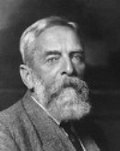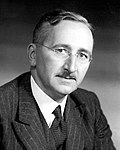Austrian economists
| Image | Name | Year of birth | Year of death | Nationality | Alma mater (postgraduate) | Notes |
|---|---|---|---|---|---|---|
 | Carl Menger | 1840 | 1921 | Austrian | Jagiellonian University | Founder of the Austrian School of economics, famous for contributing to the development of the theory of marginal utility, which contested the cost-of-production theories of value, developed by the classical economists such as Adam Smith and David Ricardo. |
 | Eugen von Böhm-Bawerk | 1851 | 1914 | Austro-Hungarian | University of Heidelberg University of Leipzig University of Jena | Wrote the three volume magnum-opus Capital and Interest . |
 | Friedrich von Wieser | 1851 | 1926 | Austro-Hungarian | University of Vienna | Wieser held posts at the universities of Vienna and Prague until succeeding Menger in Vienna in 1903, where, with brother-in-law Eugen von Böhm-Bawerk, he shaped the next generation of Austrian economists including Ludwig von Mises, Friedrich Hayek and Joseph Schumpeter in the late 1890s and early 20th century. |
 | Frank Fetter | 1863 | 1949 | American | University of Halle | Fetter's treatise, The Principles of Economics, contributed to an increased American interest in the Austrian School, including the theories of Eugen von Böhm-Bawerk, Friedrich von Wieser, Ludwig von Mises, and Friedrich Hayek. |
 | Ludwig von Mises | 1881 | 1973 | Austrian | University of Vienna | He published his magnum opus Human Action in 1949. Mises had a significant influence on the Libertarian movement that developed in the United States in the mid-20th century. |
| Joseph Schumpeter | 1883 | 1950 | Austrian | University of Vienna | Schumpeter was one of the most influential economists of the early 20th century, and popularized creative destruction, a term coined by Werner Sombart. His magnum opus is considered Capitalism, Socialism and Democracy. | |
| Benjamin Anderson | 1886 | 1949 | American | Columbia University | According to Mises, Anderson was "one of the outstanding characters in this age of the supremacy of time-servers." [1] | |
 | Henry Hazlitt | 1894 | 1993 | American | American economist, philosopher, literary critic, and journalist for such publications as The Wall Street Journal , The Nation , The American Mercury , Newsweek , and The New York Times , and he has been recognized as a leading interpreter of economic issues from the perspective of American conservatism and libertarianism. [2] | |
| Frederick Nymeyer | 1897 | 1981 | American | |||
 | Friedrich Hayek | 1899 | 1992 | Austrian | University of Vienna | In 1974, Hayek shared the Nobel Memorial Prize in Economic Sciences for his "pioneering work in the theory of money and economic fluctuations and... penetrating analysis of the interdependence of economic, social and institutional phenomena." [3] |
| William Harold Hutt | 1899 | 1988 | British | |||
| Gottfried von Haberler | 1900 | 1995 | Austrian | |||
| Fritz Machlup | 1902 | 1983 | Austro-Hungarian | University of Vienna | ||
| Paul Rosenstein-Rodan | 1902 | 1985 | Polish | |||
| Ludwig Lachmann | 1906 | 1990 | German | University of Berlin | Lachmann's ideas continue to influence contemporary social science research. Many social scientific disciplines explicitly or implicitly build on "radical subjectivist" Austrian economics. | |
 | Kurt Richebächer | 1918 | 2007 | German | ||
| Hans Sennholz | 1922 | 2007 | German-American | New York University University of Cologne | ||
 | Murray Rothbard | 1926 | 1995 | American | Columbia University | American author and economist of the Austrian School who helped define capitalist libertarianism and popularized a form of free-market anarchism he termed "anarcho-capitalism." [4] [5] [6] Rothbard wrote over twenty books and is considered a centrally important figure in the American libertarian movement. [7] |
 | Israel Kirzner | 1930 | Living | American | New York University | Kirzner's major work is in the economics of knowledge and entrepreneurship and the ethics of markets. |
| Ernest C. Pasour | 1932 | Living | American | Michigan State University | ||
| Ralph Raico | 1936 | 2016 | American | University of Chicago | ||
 | George Reisman | 1937 | Living | American | New York University | |
| Pascal Salin | 1939 | Living | French | Paris Dauphine University | ||
| Henri Lepage | 1941 | Living | French | |||
 | Walter Block | 1941 | Living | American | Columbia University | |
 | Robert Higgs | 1944 | Living | American | Johns Hopkins University | |
| Roger Garrison | 1944 | Living | American | University of Virginia | ||
 | Mark Skousen | 1947 | Living | American | George Washington University | |
 | David Gordon | 1948 | Living | American | UCLA | |
 | Hans-Hermann Hoppe | 1949 | Living | German | Goethe University Frankfurt | |
 | Joseph Salerno | 1950 | Living | American | Rutgers University | |
| Randall G. Holcombe | 1950 | Living | American | Florida State University | ||
| Richard Ebeling | 1950 | Living | American | Middlesex University | ||
| Don Lavoie | 1951 | 2001 | American | New York University | ||
 | Lawrence Reed | 1953 | Living | American | Slippery Rock University of Pennsylvania | |
| Lawrence H. White | 1954 | Living | American | UCLA | ||
 | Russell Roberts | 1954 | Living | American | University of Chicago | |
 | Jesús Huerta de Soto | 1956 | Living | Spanish | Complutense University of Madrid | |
 | Donald J. Boudreaux | 1958 | Living | American | Auburn University | |
 | Mark Thornton | 1960 | Living | American | Auburn University | |
| Peter Boettke | 1960 | Living | American | George Mason University | ||
 | David Prychitko | 1962 | Living | American | George Mason University | |
 | Peter Schiff | 1963 | Living | American | University of California, Berkeley | Host of the Peter Schiff Show, and is credited for "more or less accurately" predicting the 2008 financial crisis while the "easiest criticism of macroeconomists is that nearly all failed to foresee the recession despite plenty of warning signs." |
 | Steven Horwitz | 1964 | 2021 | American | George Mason University | |
 | Peter G. Klein | 1966 | Living | American | University of California, Berkeley | |
 | Jörg Guido Hülsmann | 1966 | Living | German | Technische Universität Berlin | |
 | Javier Milei | 1970 | Living | Argentinian | Belgrano University | He became widely known for his regular TV appearances where he has been critical of Cristina Fernández de Kirchner, Mauricio Macri and Alberto Fernández administrations. He became a Federal Deputy in 2021 and was elected as President of Argentina in 2023, running on the La Libertad Avanza ticket and beating Peronist economy minister Sergio Massa in a landslide, thereby becoming the first ever Libertarian head of state, anywhere in the world |
 | Mark Spitznagel | 1971 | Living | American | New York University | |
 | Robert P. Murphy | 1976 | Living | American | New York University | |
 | Christopher Coyne | 1977 | Living | American | George Mason University | |
 | Peter Leeson | 1979 | Living | American | George Mason University | |
| Philipp Bagus | 1980 | Living | German | Universidad Rey Juan Carlos |